If you’re a podcaster—or even just a fan of aural history—you’ll enjoy this, from PRX.
ɕ
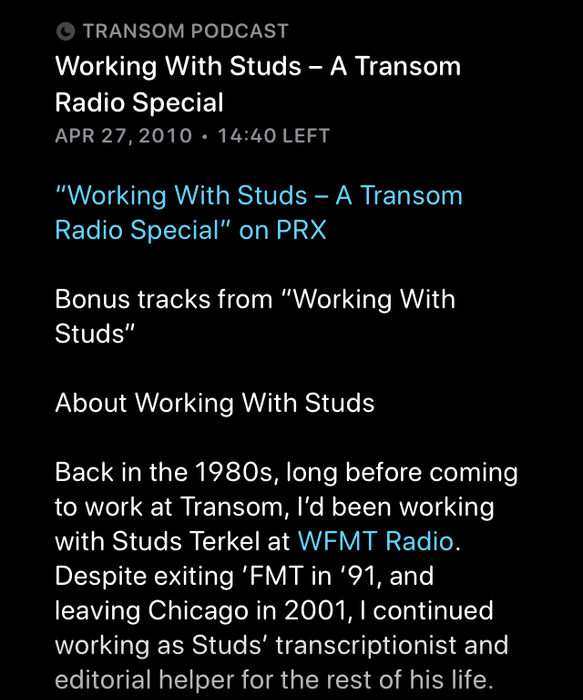
If you’re a podcaster—or even just a fan of aural history—you’ll enjoy this, from PRX.
ɕ
For me, fully internalizing this one powerful piece of inspiring profanity has been transformative. But I still find that returning regularly to the well makes all this work even better. So I downloaded both of the Goggins’s audiobooks and worked through them in little chunks on my morning walks over the period of a month. Then I moved on to Peter Attia’s Outlive, and Jocko Willink’s Extreme Ownership.
~ Peter Adeney, from The Ultimate Life Coach
I really do know what I should be doing. (I have no idea if you, or anyone else, does too.) But I can tell you that even though I know… it’s still tough to do the soul-crushing work. I’ve not read any of the books above—although Outlive is on my to-read pile.
slip:4umote3.
ɕ
A writer—and, I believe, generally all persons—must think that whatever happens to him or her is a resource. All things have been given to us for a purpose, and an artist must feel this more intensely. All this happens to us, including our humiliations, our misfortunes, our embarrassments, all is given to us as raw material, as clay, so that we may sharpen our art.
~ Jorge Luis Borges
slip:4a1282.
Many statements which are accepted as truth because they have been passed down to us by tradition look like truth only because we have never tested them, never thought about them in a more precise way.
~ Leo Tolstoy
slip:4a1021.
My dad used to suffer from insomnia, holding imaginary meetings in his head late into the night. I’m the same way.
~ “AllAmericanBreakfast” from, Mental nonsense: my anti-insomnia trick — LessWrong
slip:4ulepo13.
I read that short article and now I think I have insomnia. Sometimes, anyway. Clearly I’m a hypochondriac though. But in all seriousness, the author suggests something that—dare I say it?—I almost hope I have trouble getting to sleep tonight so I can try it.
ɕ
Why, do you not reflect, then, that the source of all human evils, and of mean-spiritedness and cowardice, is not death, but rather the fear of death? Discipline yourself, therefore, against this. To this let all your discourses, readings, exercises, tend. And then you will know that in this way alone are men made free.
~ Epictetus
slip:4a230.
For as long as I’ve been recording podcasts I’ve wanted to figure out how to learn more, and retain more, from the conversations. An audio recording of a good conversation can be a good experience for the listener; It can be good experiential learning. But the conversations contain so much more—facts sure, but also connections to other people, projects, stories, new perspectives, insights—which I know I’m missing. If something prompts my memory, I can recall the experience of the conversation, but everything else is either never learned, or if it was, I’ve subsequently lost it.
I’m reminded of…
If you remember what an author says, you have learned something from reading him. If what he says is true, you have even learned something about the world. But whether it is a fact about the book or a fact about the world that you have learned, you have gained nothing but information if you have exercised only your memory. You have not been enlightened. Enlightenment is achieved only when, in addition to knowing what an author says, you know what he means and why he says it.
~ Mortimer Adler, author of How to Read a Book, 1972
There are multiple levels of understanding and learning, contained in each conversation. At the root of my feeling that I’m missing out is the knowledge that I’m only retaining the most-superficial level of the experience.
It’s obviously for me. But by doing the writing in public everyone who finds a specific episode interesting would be able to capture and retain more of those “levels of experience” for themselves.
As I mentioned, my urge to do something more with the conversations is not new. In the Movers Mindset project, I have already experimented with ways to enable others to get more from each conversation. Two efforts in particular are worth discussing.
First, I’ve pushed the concept of episode notes to the limits of sanity. We have guest images, embedded audio player, guest pull-quotes, transcript excerpts, highlights, and the entire thing is organized by chapters—the audio files have embedded chapter information if your player-app supports it. Each section is cross-linked to the corresponding part of the full transcript; The transcripts are organized into sections which are linked back to the episode’s page. This takes massive effort involving myself, Melissa, Rev.com, custom software, and hours of time. Here, take a look at, Selene Yeager: Menopause, Health, and Writing.
Second, I’ve created a tool which enables exploring the episodes. If you were looking closely at Selene’s episode notes, you’ve seen one part of this already. The tool enables choosing a perspective, (for example, how did they answer the signature, three-words question,) and that perspective is dynamically inserted into the page that you saw. There are many other perspectives which you can interact with. (Imagine an old-fashioned, twist-adjustable kaleidoscope; the tool I built is the kaleidoscope and you’re pointing it at the entire Movers Mindset project.) If you want to try something mind-bending, take a look at, Exploring the Movers Mindset Project, where I explain it in more detail, and which includes embedded controls for playing with the current perspectives in real time.
Beyond those to efforts, I’ve always wanted to write something based on the Movers Mindset conversations. Unfortunately, they’re quite long adding to the difficulty of finding a “chunk” to work on. One of my goals in creating the Podcaster Community, was to create a short-form-conversations companion podcast. (Look for Podcaster Community wherever you listen, or you can play the episodes via embeds on the community’s forum.) Those conversations are targeted at 20 minutes which usually leads to a single, clear thread appearing in each episode. This gives me terrific material to work with as I explore how to get at the deeper levels of learning within each episode.
On July 15, 2021 I put up an article, On Storytelling, which is based on the first episode of the Podcaster Community’s companion show. That article was an experiment, and based on the responses it was a successful experiment.
Just figuring out how to write that article was an experiment. First I spent hours talking to various people about how to write an article from a conversation, and about what style, format and voice should be used in such an article. I tried a variety of tools for writing; Not simply “which text editor” but rather what process should I use. I tried: Listening and then starting with a blank page; Dumping the transcript into a spreadsheet (transcript in one column with a cell per block of dialog from each speaker) and converting each cell into corresponding prose in a second column; Working conceptually outwards to an outline of principles or topics, and then working back inwards to create prose. I eventually settled on a way to directly transform the raw transcript into a finished piece. Even though I’ve settled on a way to do it, it remains hard work. It took me three hours to write that experimental article. All of that to say: I’ve only done one, but I’m confident I can now do many more.
How many could I write? There are already 40+ episodes of the Podcaster Community’s show. I estimate there are 300 pieces of Movers Mindset episodes that could be articles. (Many episodes have 3+ threads of discussion, each the size of one of the Podcaster Community’s entire episodes.) I’ve also begun recording short-form-conversation episodes for Movers Mindset. With recording continuing across multiple projects, I have an effectively unlimited supply of raw material.
To free up enough time to write consistently, to make meaningful progress, my projects need to become a source of income for me. Movers Mindset has some patronage revenue, (you people are awesome,) and the Podcast Community has a core group of supporters, (also awesome,) which are covering its costs. But neither of them currently supports my life and creates space for this new writing.
My questions are…
Are the conversations valuable?
Would it be valuable to create articles from the conversations?
Would you be willing to support my writing efforts by supporting the Podcaster Community, or by supporing Movers Mindset?
ɕ
There are internet companies (like Basecamp, or like Automattic, makers of WordPress.com, where I work) that charge money for their products and services, and use that money to grow their business. I wish more internet companies could follow that model, but it’s hard to retrofit a legitimate business model to a product that started its life as free.
~ Jeffrey Zeldman from, Nothing Fails Like Success – A List Apart
slip:4uaiai7.
ahahahahahahahahhahaahahhaaa! Sometimes I like to share stuff just because it makes me happy. (The stuff; not the sharing of said stuff, I mean.) I regularly talk about how this web site is a vehicle for my reflection—I’m quite often literally thinking through things. Writing, (tappity-tap-tapping on the keyboard here,) and writing, (scratchity-scritch-skratching with a pen on paper,) are two of the ways I figure out if the dross I regularly find in my head actually corresponds to reality.
When I read sentences like the ones I quoted above, I leap (sometimes literally) to my feet knocking over my chair in the process. It does my weary—deeply deeply weary it be—heart good just to read sentences like this. And I hope—not in the sense that I little value your ability to think and “hope” you’ll finally get what I’m saying; no. I only hope that sometimes, some of the things I share make you happier.
ɕ
What does such a statistic have to do with your personal chance of success? Nothing at all.
~ Steve Pavlina from, What Are the Odds of Becoming a Black Belt? – Steve Pavlina
slip:4usebo20.
This has nothing to do with martial arts.
If you—you reading this right now—are NOT making mistakes, you are not learning.
Put another way: If you are always certain—or if you can’t take action until you are certain—then you are not doing the work you need to be doing.
ɕ
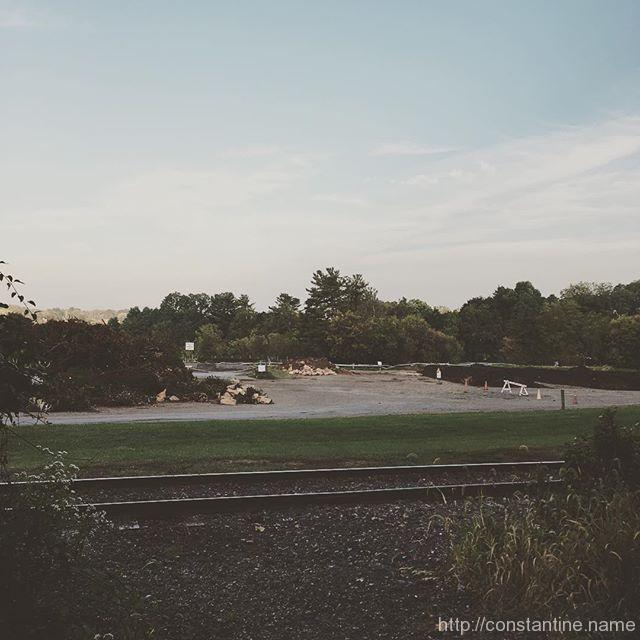
train just went past (you can see its tracks) Bad jokes: If i have to suffer, so do you :P
ɕ
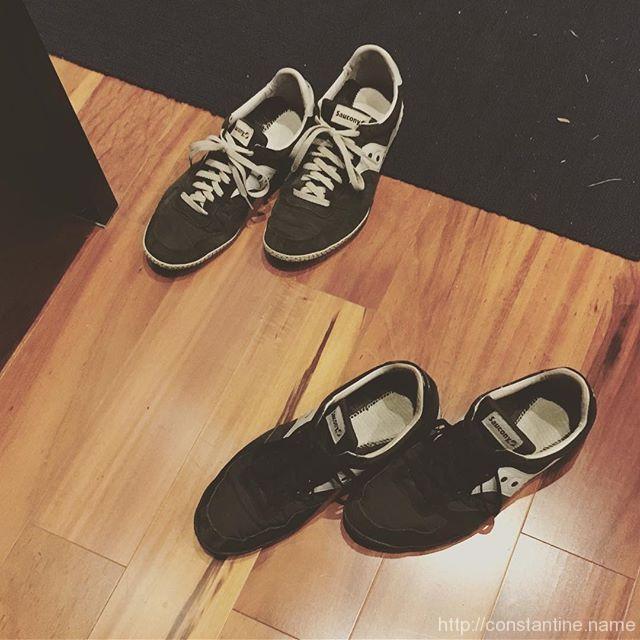
Surprise return of summer, so running in evening heat. meh.
ɕ
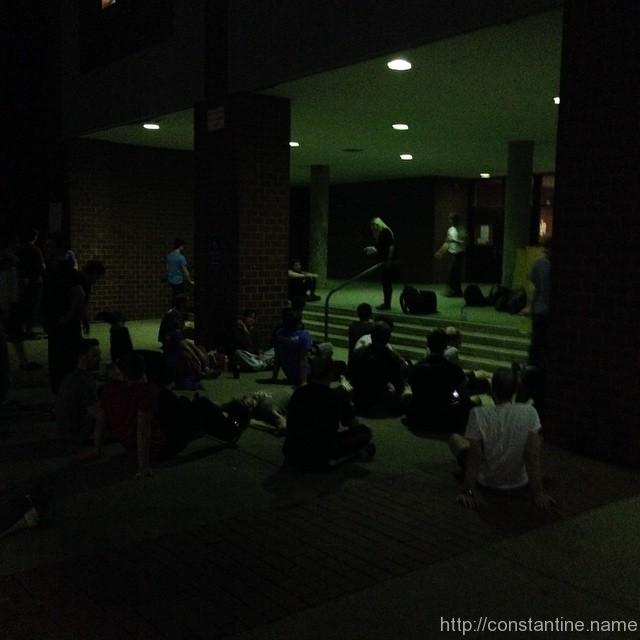
Night session. halfway. . .
ɕ
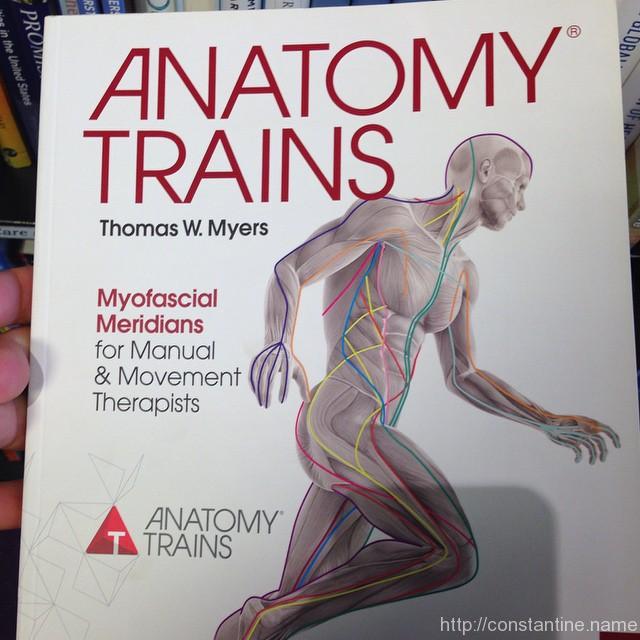
…gonna put your body on “manual”? Better bone up on physiology.
ɕ
A man’s got to have a code, a creed to live by, no matter his job.
~ John Wayne
slip:4a7.